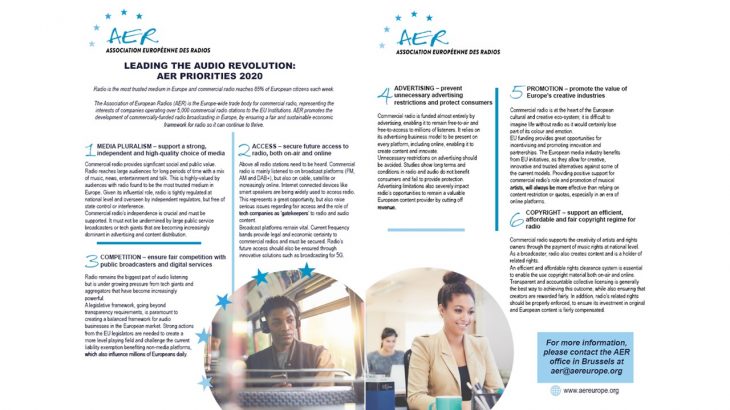LEADING THE AUDIO REVOLUTION: AER PRIORITIES
The Association of European Radios (AER) is the Europe-wide trade body for commercial radio, representing the interests of companies operating over 5,000 commercial radio stations to the EU Institutions. AER promotes the development of commercially funded radio broadcasting in Europe, by ensuring a fair and sustainable economic framework for radio so it can continue to thrive.
Radio is the most trusted medium in Europe and commercial radio reaches 85% of European citizens each week.
1. MEDIA PLURALISM – support a strong, independent and high-quality choice of media
Commercial radio provides significant social and public value. Radio reaches large audiences for long periods of time with a mix of music, news, entertainment and talk; an input that is highly-valued by audiences with radio found to be the most trusted medium in Europe. Given its influential role toward public opinion, radio is tightly regulated at national level thanks to a framework implemented by State-independent regulators.
Commercial radio’s independence is crucial and must be supported. It should not be undermined by large public service broadcasters or tech giants that are becoming increasingly dominant in advertising and content distribution.
2. ACCESS – secure future access to radio, both on-air and online
Commercial radio is mainly listened to on broadcast platforms, but also cable, satellite or online.
Its reception through FM or DAB/DAB+, complemented by IP, represents great opportunities for listeners to easily access radio. New devices like smart speakers are also being widely used to access radio and audio. This raises serious issues regarding fair access and the role of tech companies as ‘gatekeepers’ to radio and audio content.
Broadcast platforms remain vital. Current frequency bands provide legal and economic certainty to commercial radios and must be secured. With the shift from analogue to digital, radio’s access should be ensured to all listeners, through innovative solutions such as broadcasting for 5G.
3. COMPETITION – ensure fair competition with public broadcasters and digital services
Radio remains the biggest part of audio listening overall but faces particular pressure from tech giants and aggregators which have become increasingly powerful.
A legislative framework, going beyond transparency requirements, is paramount to creating a balanced framework for audio businesses in the European market. Strong actions from the EU Legislators are needed to create a more level playing field and challenge the current liability exemption benefiting to non-media platforms that equally influence millions of Europeans daily.
4. ADVERTISING – prevent unnecessary advertising restrictions and protect consumers
Commercial radio is funded almost entirely by advertising, enabling it to remain free-to-air and free-to-access to millions of listeners. It relies on its advertising business model to be present on every platform, including online, enabling it to create content and innovate.
Unnecessary restrictions on advertising should be avoided, as studies show long terms and conditions in radio and audio do not benefit consumers and fail to provide protection. Advertising limitations offline and online also severely impact radio’s opportunities to remain a valuable European content provider by cutting off revenue.
5. PROMOTION – promote the value of Europe’s creative industries
Commercial radio is at the heart of the European cultural and creative eco-system; it is difficult to imagine life without radio as it would certainly lose part of its colour and emotion.
EU funding provides great opportunities for incentivising and promoting innovation and EU partnerships. Initiatives from the European media industry require promoting from the EU; they allow for creative, innovative and trusted alternatives against some of the current models. Equally, commercial radio remains of great importance for the promotion of artists. Introducing content restriction or quotas hinders their economic viability, especially in an era of online platforms.
6. COPYRIGHT – support an efficient, affordable and fair copyright regime for radio
Commercial radio supports the creativity of artists and rightsowners through the diligent payment of rights thanks to efficient systems in place at national level. As a broadcaster, radio creates content and is also a rightsholder of related right.
An efficient and affordable rights clearance to use copyright material both on-air and online is paramount to radio’s future. Transparent and accountable collective licensing is generally the best way to achieving this outcome, while also ensuring that creators are rewarded fairly. In addition, radio’s related rights when its content is being accessed on a digital environment should be properly enforced to ensure its investment in original and European content is fairly compensated.
For more information, please contact the AER office in Brussels at aer(Replace this parenthesis with the @ sign)aereurope.org
